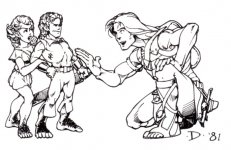QuentinGeorge
Legend
I don't want Halflings to be more warlike. I want to know why dwarves and elves are ever watchful and prepared for racial enemies whereas halflings can sit around doing nothing until someone threatens the world with apocalypse.
You're too focused on the rather adolescent obsession with military power and conquest that you are overlooking something important. Halflings don't have "racial enemies". They have more allies than enemies.
So while the orc horde approaches and the halfling militia prepare for battle, supported by the cleric of Yondalla, the signal goes out. The human king, worried about the threat to his most loyal vassals, sends forth his soldiers; the dwarves, remembering the ale and good times shared with their halfling friends, march forth from their mountain fortress; the elves, knowing their halfling neighbours are kind, considerate, send a squad of rangers, and the gnomes, remembering the fun and laughter they shared, come from their lairs to fight as well.
By the time the orc horde arrives reinforcements are well on the way, the halfing warriors put up a big fight, and oh, what's this? Well, it seems a pastoral idyll of great food, kind people, plentiful ale is the perfect place for retirement, particularly for archmages...

Halflings have warriors, halflings have spellcasters, but they also have friends. Pretty much everyone likes them, and you fight for your friends because they'll fight for you.



